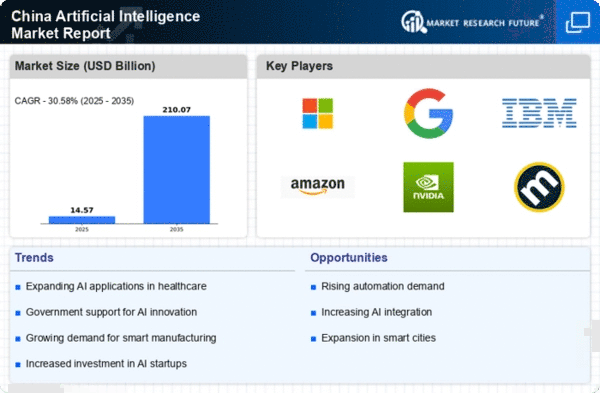Growing Demand for Automation
The demand for automation across various industries is significantly influencing the artificial intelligence market in China. As businesses seek to enhance operational efficiency and reduce costs, the adoption of AI-driven automation solutions is becoming more prevalent. Industries such as logistics and retail are increasingly utilizing AI for inventory management and customer service, leading to improved performance metrics. Reports indicate that the automation market in China could reach $100 billion by 2025, with AI technologies playing a central role. This trend suggests that the artificial intelligence market will continue to expand as organizations recognize the potential benefits of automation in driving growth and competitiveness.
Rapid Technological Advancements
Technological advancements are a driving force behind the growth of the artificial intelligence market in China. Innovations in machine learning, natural language processing, and computer vision are transforming various sectors, including finance, manufacturing, and transportation. For instance, the integration of AI in smart manufacturing has led to a projected increase in productivity by up to 30% over the next few years. Additionally, advancements in AI algorithms and hardware capabilities are enabling more sophisticated applications, which further fuels market expansion. As companies increasingly adopt these technologies, the artificial intelligence market is likely to witness accelerated growth, driven by the demand for efficiency and automation.
Investment in AI Talent Development
The cultivation of AI talent is essential for sustaining the growth of the artificial intelligence market in China. Educational institutions and private enterprises are increasingly focusing on developing a skilled workforce equipped with AI competencies. Initiatives such as specialized AI training programs and partnerships with universities are being implemented to address the talent gap. Reports suggest that the demand for AI professionals in China could exceed 5 million by 2030. This emphasis on talent development not only supports the immediate needs of the artificial intelligence market but also ensures long-term innovation and competitiveness in the global landscape.
Government Support and Policy Framework
The Chinese government plays a pivotal role in shaping the artificial intelligence market through robust support and strategic policy frameworks. Initiatives such as the New Generation Artificial Intelligence Development Plan aim to position China as a leader in AI by 2030. This plan includes substantial funding, estimated at over $150 billion, to foster innovation and research in AI technologies. Furthermore, the government encourages collaboration between academia and industry, which is crucial for the growth of the artificial intelligence market. By establishing favorable regulations and incentives, the government not only stimulates investment but also ensures that the artificial intelligence market aligns with national interests and security concerns.
Increased Data Generation and Availability
The exponential growth of data generation in China is a crucial driver for the artificial intelligence market. With the rise of IoT devices, social media, and digital transactions, vast amounts of data are being produced daily. This data serves as a valuable resource for training AI models, enhancing their accuracy and effectiveness. The Chinese government has also emphasized the importance of data sharing and collaboration among enterprises, which further enriches the data ecosystem. As organizations leverage this data to develop AI applications, the artificial intelligence market is expected to thrive, with data-driven insights becoming integral to business strategies.
















